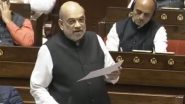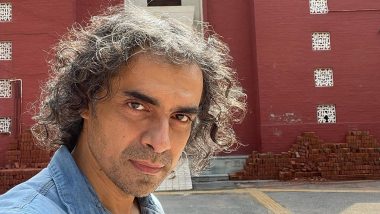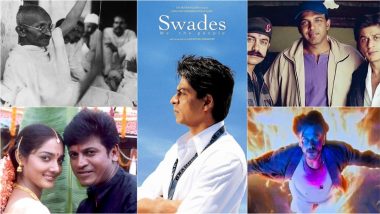Filmmaker Imtiaz Ali has over the years cultivated his audience, courtesy his quirky films that touch upon the nerve of philosophy of desire, self-discovery and a sense of self-awareness. The filmmaker, who tasted success with his first film 'Socha Na Tha' - a sleeper hit, delivered an even bigger film with Kareena Kapoor Khan and Shahid Kapoor in the form of Jab We Met - a film that the fans of romance genre still live by. Superstar Singer 2: Imtiaz Ali Offers Contestant Mohammad Faiz Chance To Sing in His Next Directorial.
Later, he played a crucial part in cementing the success of Kareena's cousin Ranbir Kapoor with films like Rockstar and Tamasha. As his recent show, 'Dr. Arora- Gupt Rog Visheshagya' streams on SonyLIV and garner positive response, Imtiaz spoke with IANS about working with Oscar-winning composer A.R. Rahman, hit machine Pritam, the cult following that his film 'Tamasha' has gained over the years and how travelling enriches the artiste in him. Dr Arora-Gupt Rog Visheshagya: Ahead of Release of Imtiaz Ali’s Sony LIV Show, Filmmaker Weighs on the Profession of Sexologist.
Imtiaz, who has delivered steady hits with both A.R. Rahman Rockstar, Highway and Tamasha) and Pritam Jab We Met, both Love Aaj Kal films and 'Jab Harry Met Sejal') finds it difficult to pick his favourite. He calls both the composers "absolute geniuses in their own rights. Having worked with Rahman on three albums has made him realise that "A.R. Rahman is very organic and works sans any safety net". Pritam's process on the other hand is marked by creative chaos in his opinion. He adds that, "There's a method to Pritam's madness. He will chase excellence to the last mile." "Working with music directors like them gives me the biggest thrill", he further shares.
His show 'Dr. Arora- Gupt Rog Visheshagya' is born out of his memories from his college days when he used to travel to Delhi from his hometown of Jamshedpur in trains. The advertisements and wall graffiti of sexologists on the outskirts of towns intrigued him to follow the medical practitioners' story and world.
Ask him the importance of travelling for any creative person and he says: "To take the slow route is very important because there's so much to learn. You meet so many people and come across so many stories. For me, travelling is my lifeblood. I can't understand filmmaking without travelling."
In the same vein, he gives sound advice to aspiring storytellers: "I'll suggest every filmmaker especially in India to make it a point to travel and explore the country." "Mahatma Gandhi travelled extensively across the country because he wanted to understand the people that he was standing up for", he says, furnishing a touch of history to his point well made.
Talking about the titular character of his show - a sexologist, Imtiaz shares: "This doctor travels a lot, he has clinics in three towns and he stays in the fourth town. Accordingly, his week is marked. Since the character travels a lot, that adds a lot to the story and also the music of the series. He meets different people during his journey, for example a medical representative that makes the plotlines interesting."
'Tamasha' which will soon clock seven years in November, has become an important part of India's pop-culture, especially in the cinephile circles. When asked about his opinion on how the film has marinated over the course of time in the audience's subconscious, the filmmaker responds: "A lot of people in these many years have come up to me and told me that they left their job after watching 'Tamasha' and I get very scared when I hear that although it's a compliment."
He mentions further, "I'm aware that it's a huge responsibility but at the same time I tell them to put everything that they have in the course of following their dreams otherwise they will blame me for the rest of their lives (laughs)." As a filmmaker, he feels contended that his film has managed to touch so many lives and continues to be a topic of discussions after half a decade, "I feel 'Tamasha' has been loved and appreciated a lot. I realised the kind of vulnerability that we had put ourselves through to do justice to those scenes."
"I feel a film belongs to the viewers and that's the litmus test of a film. If the audience loves your film, you have done a good work and if the audience rejects it, it's a gone case no matter how much you were invested in it", he concludes.
(The above story first appeared on LatestLY on Aug 07, 2022 05:35 PM IST. For more news and updates on politics, world, sports, entertainment and lifestyle, log on to our website latestly.com).













 Quickly
Quickly




















